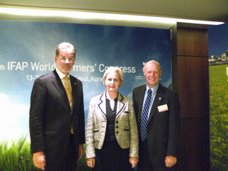Nothing is more inspiring as when to hear people from the in Agriterra paryicipating farmers organisations tell enthusiastically concerning their experiences. In March 75 farmers from the whole region in the South of the Netherlands belonging to ZLTO, one of the three branches of the farmers federation of the Netherlands, came together in a study event. From the introducing words of Kees Coppens and Ton Duffhues it became clear that international cooperation has been anchored in a perfect manner in the complete organisation of the ZLTO. Like with all other issues, development cooperation has office holders at all levels of the organisation, there are structural links with other with the offices, local groups liaise with higher levels and the ideas and initiatives are screened in a clear manner. There is also an investment in making people enthusiatic for this part of the work of the ZLTO. The study day was of this a good example.
Splendid experiences passed the revue. Caracteristic was the anecdote of Lambert Bardoel who for Agriterra/AgroNed's project in Romania regularly visited producers in Rumania for improvement of the tomatoes - and paprika cultivation. When he observed that in the warm summer did not survive a large part of the seedlings, he suggested to use plastic coffee cups to let them grow protected. After they were strong enough, the cup was then cut open and the little plant was put in the ground. The next year the field showed a significantly better production. A farmer told enthusiastically that he had adopted this method, but that he did not cut the cups open. He thought it a waste. If you press with your inch against the base the seedling comes also and the cup can be "recycled"! He introduced this method meanwhile to the other farmers. He showed Lambert in its barn a large stock plastic coffee cups. During the annual beer party the cups were left spread in the party area, so he and his wife came at night and collected them all!
A another nice story was told by Bert Sandee. He met in Niger a stock breeder who also cultivated strawberries for hotels in the city. Bert told him how we in the Netherlands mislead the strawberry plants by laying them during a short time in the refrigeration. Once taken out, the leittle plant thinks that spring has come and will start giving strawberries. The Nigerees impressed by splendid story, explained that it was similar to what he himself does with its guinea fowls. Regularly he climbs on the roof of his barn and with a watering-can trows water on it. The guinea fowls think then that the rain season has started and begin to lay eggs. A splendid example of how everyone comes on his own side of the world eventually with some serendipity to the same ideas.
Also Wilma van der Weele had good experiences in Niger. What especially stood out in her story was how well the 'from farmer-to-farmer' method for horizontal exchange on technology works. Colleagues worldwide understand each other. That is a first requirement for a good contact. She found a Niger consultant which had established contact with the farmers of thye Farmers Platform in Niger on behalf of a foreign developing organisation. But in spite of the fact that he wasa compatriot, the contact was less smooth. This had very much to do with his attidtude of consultant, that compared negatively to colleagues that exchange information on an equal level.
All these stories told by farmers of the ZLTO illustrate how much of the development cooperation principles of Agriterra are completely internalized in the Dutch ZLTO and how these concepts are introduced on a systematic bases to all office holders. This is as such a great story on how awareness raising becomes a natural collateral of practical support efforts among farmers.
Sunday, March 25, 2007
Subscribe to:
Posts (Atom)
Check these interesting contributions from other sites & blogs
- On Farmers Organization in Egypt
- Law on farmers Organizations in China
- Interview with FAO officials on Farmers Organizations
- Farmers use mobile phones
- comment of Kees Blokland on anti-CAP campaigning
- Poverty & growth blog of the World Bank
- Gapminder statistics visualized
- Guide for implementing ICT projects - iCommons december 2006
- Africa: tools of liberalisation - Patricia Daniel, University of Wolverhampton, England
- Business and the rural poor - Harvard Business School
- Profiling Asian Farmers Association members - Jan 4th, 2007
- Fiji Times report on AgriCord grants to Sugar Farmers - January 04, 2007
- Increasing Impact - marrying micro-credit and micro-insurance - The disconfort Zone, january 4th, 2007
- Programs that Fight Poverty - Institute for Advanced Technologies in Global Resilience - November 17, 2006
- University of Chicago Press Journals reports on GMOs - January 25, 2007
- Biotech crops to help reduce poverty - Kauser A Malik, in the Daily Times (Pakistan) January 25, 2007
- Why does China grow so fast - Michael Spence The Wall Street Journal 23 january 2007





